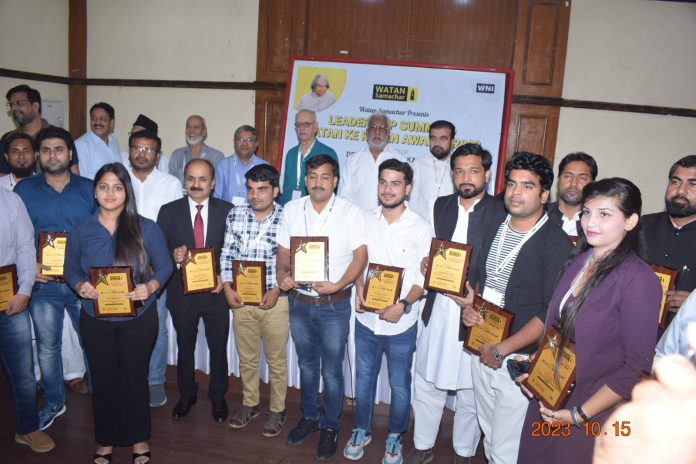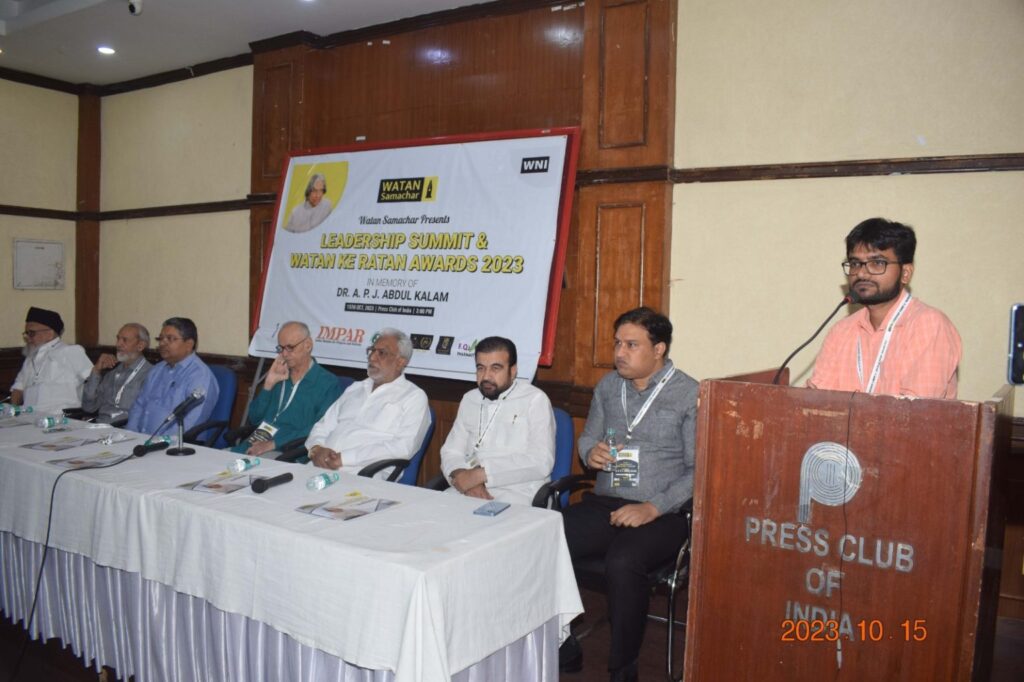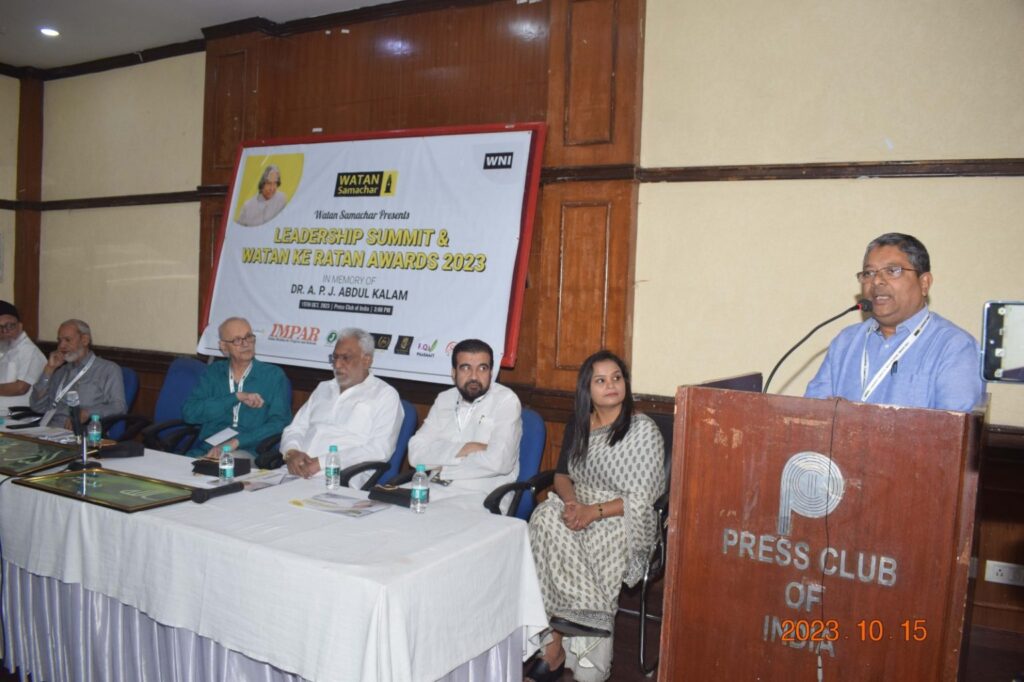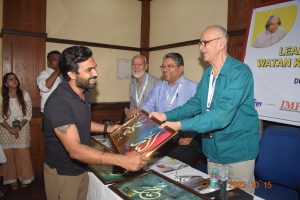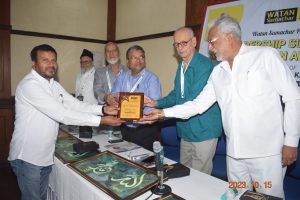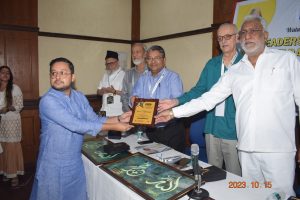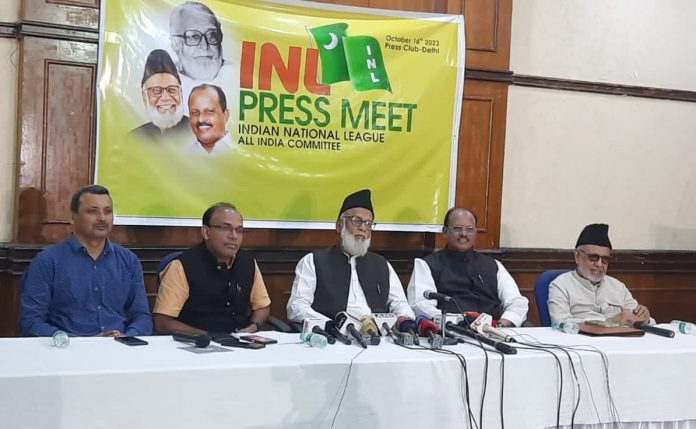NEW DELHI:
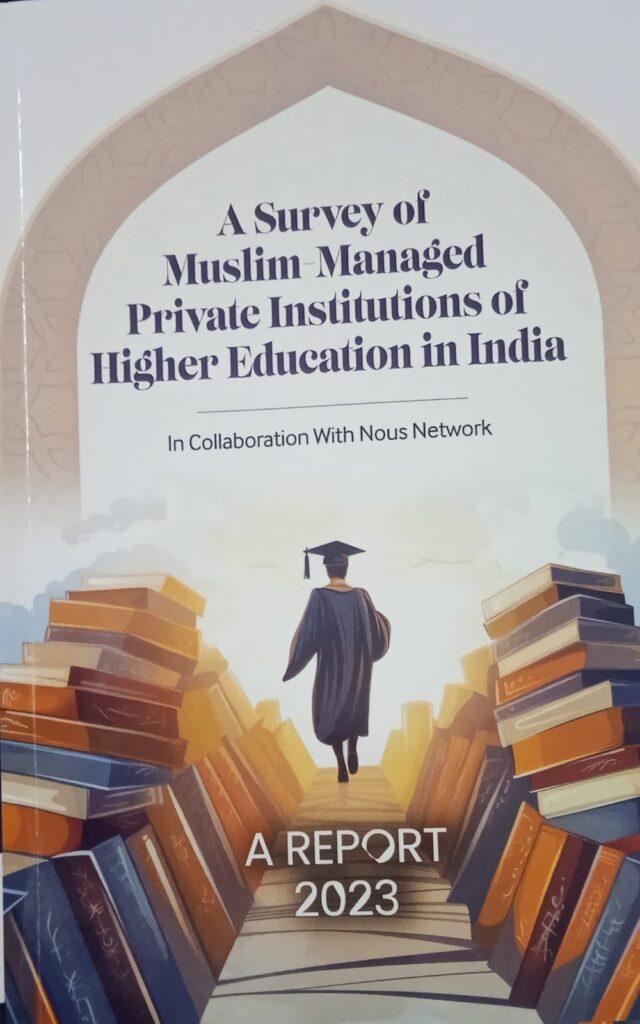
New Delhi:
A recent study, coinciding with the hearing of the AMU minority status case in the Supreme Court, has revealed that the majority of students in Muslim minority institutions hail from the majority Hindu community.
According to the report, 52.7 per cent of students in the Muslim-run institutions are Hindus and only 42.1 per cent of students are Muslims.
These startling revelations have been made in two reports: “A Survey of Muslim-Affiliated Private Institutions of Higher Education in India” and “Two Decades after Sachar: A Socio-Economic Survey of Indian Muslims”.
These reports have been prepared by the Delhi-based think tank Centre for Study and Research (CSR) in collaboration with NOUS Network.
The reports were released by Jamaat-e-Islami Hind President Syed Sadatullah Husaini along with other dignitaries at the India International Centre here two days ago.
CRS is a not-for-profit organisation and aims at knowledge production in domains pertaining to all sciences impacting human civilisation. The CSR survey marks the first attempt of its kind to map the higher education institutes managed by the Muslim minority community across India. The data provides a reference point to track the growth in Muslim institutes over the coming years.
The findings of the report are quite significant to blast the stereotype view held by a section of the majority community having proximity to BJP and other groups who believe that only Muslim students study in the Muslim-run education institutes. This indicates that Muslim institutes not only serve the Muslim community which is educationally very backward but also the Hindu community students. To be exact, while these institutions have the title of minority-run institutions, they perform the role of national and secular institutions that offer education to all communities irrespective of their faith and culture. So, the role of Muslim institutions in spreading education to all communities is second to none.
The report says that Muslim minority manages 23 of India’s 1,113 universities where Hindu students account for 52.7% against 42.1 percent of Muslim students.
Similarly, across the 1,155 colleges managed by Muslim minorities, non-Muslims form the majority, with Hindus constituting 55.1% of enrolled students, followed by 42.1% Muslims and 2.8% belonging to other minority groups.
JIH chief hails reports prepared on Muslim-run institutions
Addressing the audience, JIH chief praised the survey that highlighted the contributions of Muslim-run institutions in not only providing education to Muslims but also to non-Muslims.
He commended their efforts in providing educational opportunities to vulnerable groups, communities, and female students.
With reference to the ongoing legal battle for Aligarh Muslim University’s minority status, Mr. Husaini emphasized the importance of minorities’ right to establish and manage their own educational institutions.
The JIH supremo described the two survey reports as “vital documents” offering valuable insights for government officials, policymakers, scholars, educators, community leaders, and researchers seeking to understand the educational landscape for Muslims in India.
Praising the data’s potential, the JIH President emphasized how it can improve education quality, uplift the Muslim community, and guide policy making towards equal educational opportunities for all.
“These findings, exploring diverse aspects of Muslim education, offer a roadmap for actionable initiatives,” he said.
CSR director Dr. Rizwan highlights Muslim institutions’ role in education
CSR Director Dr. Mohammad Rizwan highlighted the collaborative effort behind the study on Muslim-run institutions. He said, “Prepared with the help of NOUS Network led by CEO Ali Javed, the report examines higher educational institutions managed by Muslim societies and trusts, including those founded by Muslims and currently overseen by government agencies.”
Dr Rizwan, in his address, presented an analysis of student enrolment patterns, gender representation, and the socio-economic background of Muslim students.
In a conversation with this scribe, Dr. Rizwan emphasized the key takeaways from the report. He stressed the importance of understanding the dynamics of Muslim-run institutions for informed policymaking.
The report’s findings, he noted, highlight the unique needs of the Muslim minority in higher education and advocate for targeted interventions.
Speaking about the Indian Muslim community’s educational landscape, Dr. Rizwan reiterated the crucial role of institutions run by the Muslim minority and their significance in not only serving the community’s needs but also those of other communities. He stated that these institutions ultimately contribute to the nation’s educational advancement by uplifting a broader population.
CSR Director hailed the study as a groundbreaking first, highlighting that no previous research has investigated the number of higher education institutions affiliated with Muslim minority groups.
Dr. Rizwan explained the study’s unique methodology, highlighting its use of data from AISHE, AICTE, NCMEI, and NAAC reports to meticulously identify and compile a comprehensive list of Muslim-affiliated higher education institutions in India, ensuring a thorough analysis of the educational landscape.
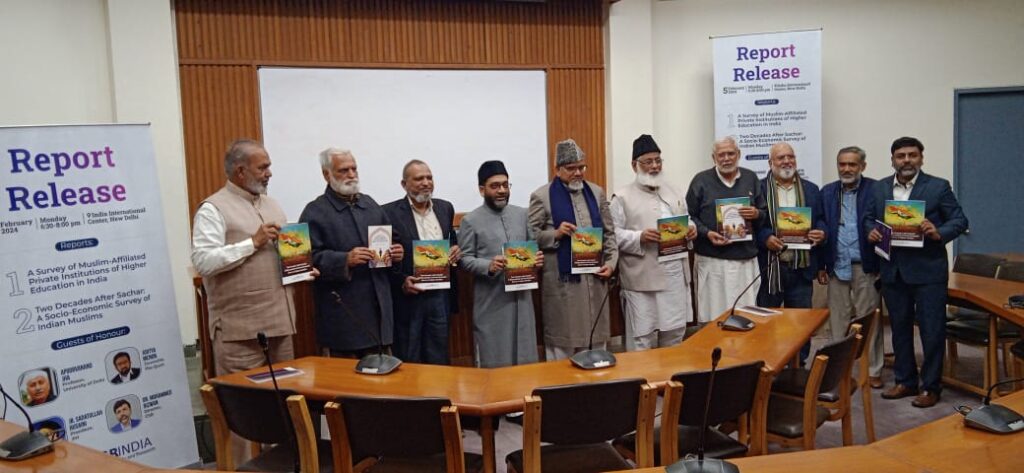
Highlighting key findings of Muslim institutions survey
A striking finding from “A Survey of Muslim-Affiliated Private Institutions of Higher Education in India,” reveals that despite constituting 73.4% of all minority groups, Muslims manage only 16.6% of colleges run by minority communities. Conversely, other minority groups, representing 26.6% of the population, manage the remaining 83.4% of these colleges.
The survey found that in 1947, at the time of independence, there were only 22 Muslim higher education institutes. In over seven decades, this number has grown to just 1,178, which includes 23 universities and 1,155 colleges. Critics have pointed out that the Muslim community, which comprises over 14% of India’s population, did not undertake concerted efforts to establish educational institutes over this long period.
University Landscape
Among India’s 1,113 universities, 23 are categorized as Muslim minority institutions, according to the 2020-21 AISHE data. The report traces the growth of Muslim minority universities from just five at India’s independence in 1947 to the current 23. Despite the passage of 75 years, the Muslim community established only 18 additional universities. The majority (43.5%) are privately managed, and nearly 70% are located in urban areas, emphasizing the need for rural educational infrastructure.
Among the key findings, Uttar Pradesh, with the largest Muslim population in the country at around 38 million, has the highest number of Muslim universities (6), followed by Karnataka with three.
College Scenario
Among the 43,796 colleges in India, 1,155 are managed by the Muslim minority community. From 17 Muslim colleges in 1947, the number has surged to 1,155 over 75 years. In terms of growth trends, the decade from 2001-2010 saw the highest increase in number of Muslim colleges at 416, while in the most recent decade from 2011-2020, only 316 new colleges were established.
Kerala leads in terms of highest number of colleges at 211, followed by Uttar Pradesh at 209. The survey notes that 10 states – Kerala, Uttar Pradesh, Maharashtra, Karnataka, Telangana, Tamil Nadu, Andhra Pradesh, West Bengal, Bihar and Jammu and Kashmir account for over 90% of all Muslim colleges in the country. However, the majority of these colleges (57.8%) are in rural areas. Despite comprising 73.4% of all minority groups, Muslim minorities hold a mere 16.6% share in colleges, showcasing a significant disparity.
Muslim institutions lack participation in quality assessment
The report has sparked concern about the quality of education at Muslim-affiliated higher education institutions in India, highlighting their low participation in national quality assessment frameworks.
A staggering 90.65% of Muslim colleges and 56.5% of universities lack accreditation by the National Assessment and Accreditation Council (NAAC), a key benchmark for educational quality.
Only 21.7% of universities and a mere 3.1% of colleges participated in the 2023 National Institutional Ranking Framework (NIRF), with 96.4% of Muslim minority colleges entirely absent. Only 36 Muslim colleges participated in the NIRF ranking process of 2023, suggesting a potential need for further investigation and support to improve their standing.
No Muslim minority college secured a spot in the top 100 NIRF rankings, raising further questions about their overall academic standing.
Enrolment Patterns of Muslim students a cause for concern
The latest reports reveal a stark underrepresentation of Muslims in higher education, with only 4.9% enrolment as compared to other religious groups. In institutions of national importance, such as IITs, IIMs, and NITs, the representation drops to a mere 1.92%.
The report reveals that Muslim students predominantly opt for undergraduate programs (90.6%). The survey pegs the total enrolment in Muslim universities at around 98,000 students, while enrolment in Muslim colleges stands at over half a million. However, the majority of Muslim students opt for undergraduate programmes, with just about 8% pursuing Postgraduate courses and less than 1% enrolled in research programmes like MPhil and PhD.
The enrolment figures highlight the need for greater focus on higher education and research among the Muslim community.
The report also highlights gender-wise and social group-wise distribution of students, pointing out the need for increased representation of Muslims in higher education.
Female Enrolment Dominates Muslim Colleges
The survey points out that the share of female students among the Muslim student population is amazingly encouraging at over 52% in colleges and 37% in universities. In terms of social groups, about half of the enrolled Muslim students come from the general category, while around 48% are from OBCs. Representation from STs is negligible at less than 1%.
Females outnumbered males across all programme levels – undergraduate (50.9%), postgraduate (59.43%), and certificate (62.45%) in Muslim run colleges. This female majority even extends to Muslim students enrolled in colleges, with females constituting 52.82% of the total. Higher degree programmes (M.Phil. and Ph.D.) buck the trend, with male representation exceeding female.
Unlike colleges, universities witnessed a stark contrast, with males constituting 63.19% of the enrolled students. Only in the M.Phil. program did females hold a slight majority with 11 students enrolled.
Educators, policymakers see Muslim education report as roadmap for improvement
After launching the reports and briefing about them, a roundtable discussion was held, in which educators, policymakers, and stakeholders applauded the report on Muslim-managed higher education institutions as a valuable resource for addressing existing challenges.
Among those welcoming the report were JIH Markazi Taleemi Board (MTB) chairman Professor Mohammad Salim Engineer, Mr. M. Farooq (who runs various educational institutions in Maharashtra), and researcher Sadat Husain.
They described the survey report as a roadmap for improvement, offering insights and recommendations for policymakers and educators.
They also recommended enhancing access to higher education through scholarships and financial aid mechanisms exclusive for economically marginalized Muslim youths; creating special drives to encourage NAAC accreditation and NIRF participation among Muslim institutes; establishing dedicated cells to promote research publications from Muslim institutes; and exploring public-private partnerships and Resource Centres to elevate standards of existing Muslim colleges.
JIH Markazi Taleemi Board Director Syed Tanveer Ahmed stressed the importance of data collection and research for effective action.
“This report offers valuable insights,” he said, highlighting the need for “affirmative actions” based on data, not just “perceptions.” He urged the community and its NGOs to study the report and suggest concrete steps based on its findings.
Mr. Ahmed expressed the view that a well-informed minority can effectively play a role of majority in a democracy, underscoring the importance of trust in research and data to foster genuine awareness. He urged the Muslim community to actively engage in data collection, citing the commendable efforts of CSR in this regard.
According to Mr. Ahmed, community organizations should closely examine reports generated from surveys and provide valuable inputs on potential actions for both the community and its NGOs. He highlighted the need for strategic efforts in the political domain to advocate for affirmative action, emphasizing that the Muslim community often lacks interest, practice, and seriousness in collecting data.
The data collected, according to Mr. Ahmed, serves as a guide for implementing affirmative actions in the education sector for the Muslim community. He suggested that if the number of universities is insufficient, the government should formulate policies to facilitate the establishment of universities by Muslim NGOs and institutions. Additionally, Mr. Ahmed addressed some threats to the Muslim minority in the education sector, pointing to the misinterpretation of Article 30, particularly in reference to the AMU case.
The MTB director suggested that the two reports be discussed widely across the country at all levels – local, state, and national. He believes distributing the report to stakeholders and government agencies will generate broader discussion and potential impacts.
He also called upon social organizations to actively work towards altering the overall attitude of the Muslim community towards education.
CSR coordinator Syed Ahmed Muzakkir, who coordinated the event, presented a concise summary of the reports verbally.
source: http://www.indiatomorrow.net / India Tomorrow / Home> Education / by Anwarulhaq Baig / February 07th, 2024
